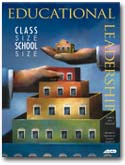The Small Schools Workshop Web site, created by the University of Illinois, features successful small schools and the most recent research on school size.
The smaller the class or school, the more individual attention the students will get, and the more they will achieve. Seems like a truism, if there ever was one. This issue of EL explores such questions as Does research support the relationship between small class and school size and high achievement? For what grade levels? For which students? How much will this cost? Are there creative alternatives? The following Web sites may help you sort out the debate.
Project STAR and Class Size
You can find much information—both pro and con—on the Internet about this famous, large, longitudinal study in Tennessee on the effects of class size on student achievement. The Laboratory for School Success (LSS) provided a summary of this study, its findings, and answers to questions like “Is the expense worth it?” (www.temple.edu/LSS/spot207.htm).
For an analysis of Project STAR by the American Federation of Teachers, visit the AFT Web site for a policy brief that discusses the STAR study and other recent ones that support the findings that class size makes a positive difference (www.aft.org/edissues/policybriefs/download/policy3.pdf). The National Education Association has also provided much information on class size issues (www.nea.org/topics/classsize). To give educators a glimpse of the other side of the class size debate, Education World has published a series of articles (www.education-world.com/a_admin/admin051.shtml) with discussions by Eric A. Hanushek, Chester Finn, and Robert Slavin.
For guidelines on applying for assistance from the U.S. Department of Education, visit the Class Size Reduction Program Web site (), published in 2000 and expiring in 2003. This site provides progress reports from states and districts that have applied the funds to reduce class sizes in the primary grades.
School Size
Whether you are talking about urban, suburban, or rural schools, many educators advocate small schools as a way to promote student achievement and success in life. For example, the Rural School and Community Trust has published a report in favor of small schools (in a study covering four states), but not necessarily smaller classes (www.ruralchallengepolicy.org/nat_sum.html).
On to urban schools: Check out the Northwest Regional Educational Laboratory (NWREL) and its research-based summaries on small schools (www.nwrel.org/nwreport/may96/small.html). Explore this site for the School Improvement Research Series and an insightful research synthesis by Kathleen Cotton entitled “Educating Urban Minority Youth: Research on Effective Practices” (www.nwrel.org/scpd/sirs/5/topsyn4.html).
And suburban schools? Again, Cotton has investigated and found similar effects of school size in suburbia (www.nwrel.org/scpd/sirs/10/c020.html) in a report, “School Size, School Climate, and Student Performance.”
Professional Development
Since 1991, the University of Illinois has conducted Small Schools Workshops. Check out the site's news articles for recent findings about small schools, for example in Texas and Arizona (). Register for a workshop, use the Listserv, or read about planned activities.
Don't overlook the National Association for Small Schools (NASS) in the United Kingdom (www.smallschools.org.uk): “Since 1978, the National Association for Small Schools has been the voice for those who believe that small schools and village schools are too valuable to lose.”
And here's a professional development opportunity just a click away: The Annenberg Institute for School Reform has reported discussions at a meeting on “Small Schools, Race, and High School Reform,” including input from James Banks, Mary Anne Raywid, Sonia Hernandez, and many other educators (www.annenberginstitute.org/convening/race_summary2.html).
